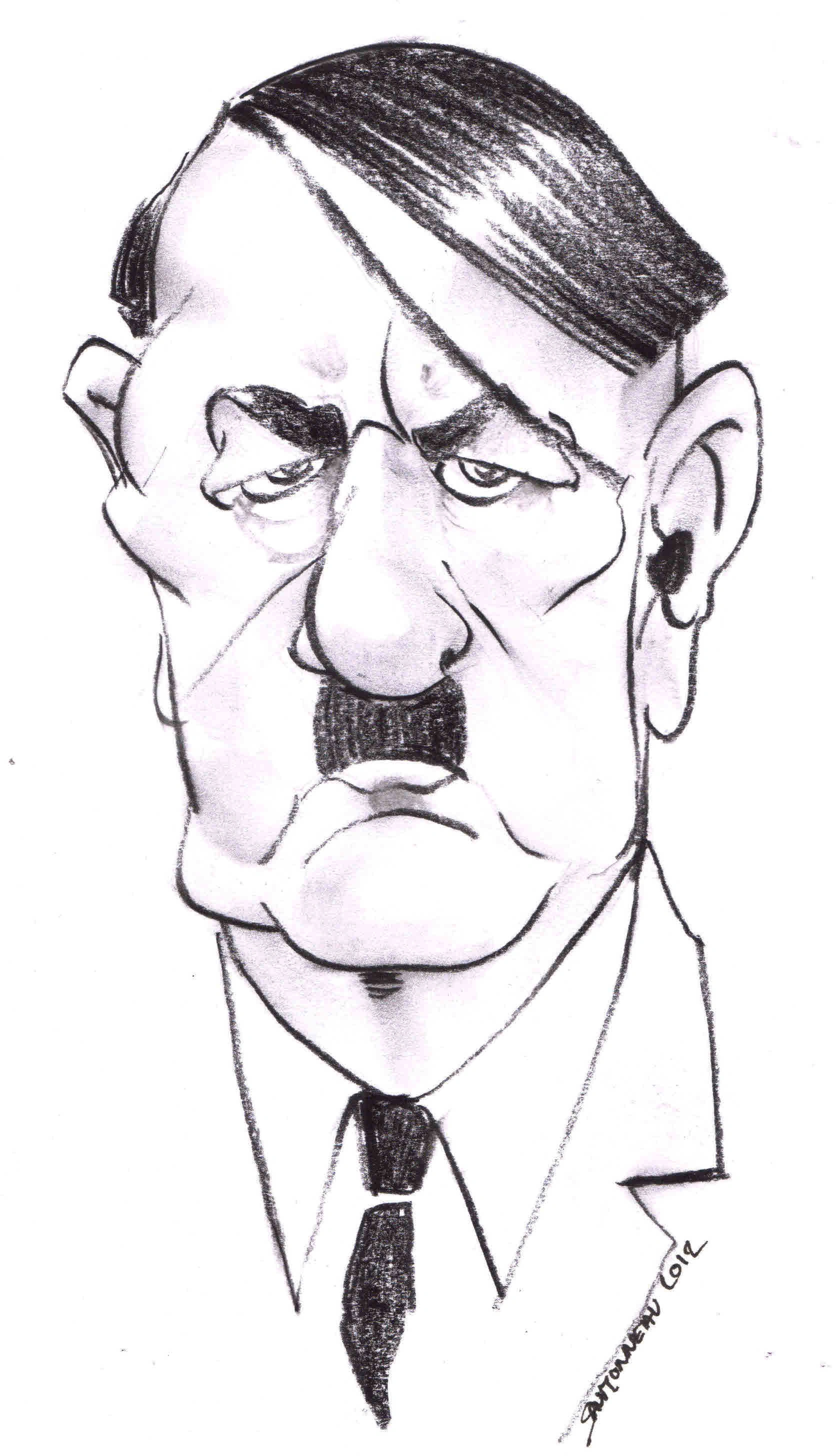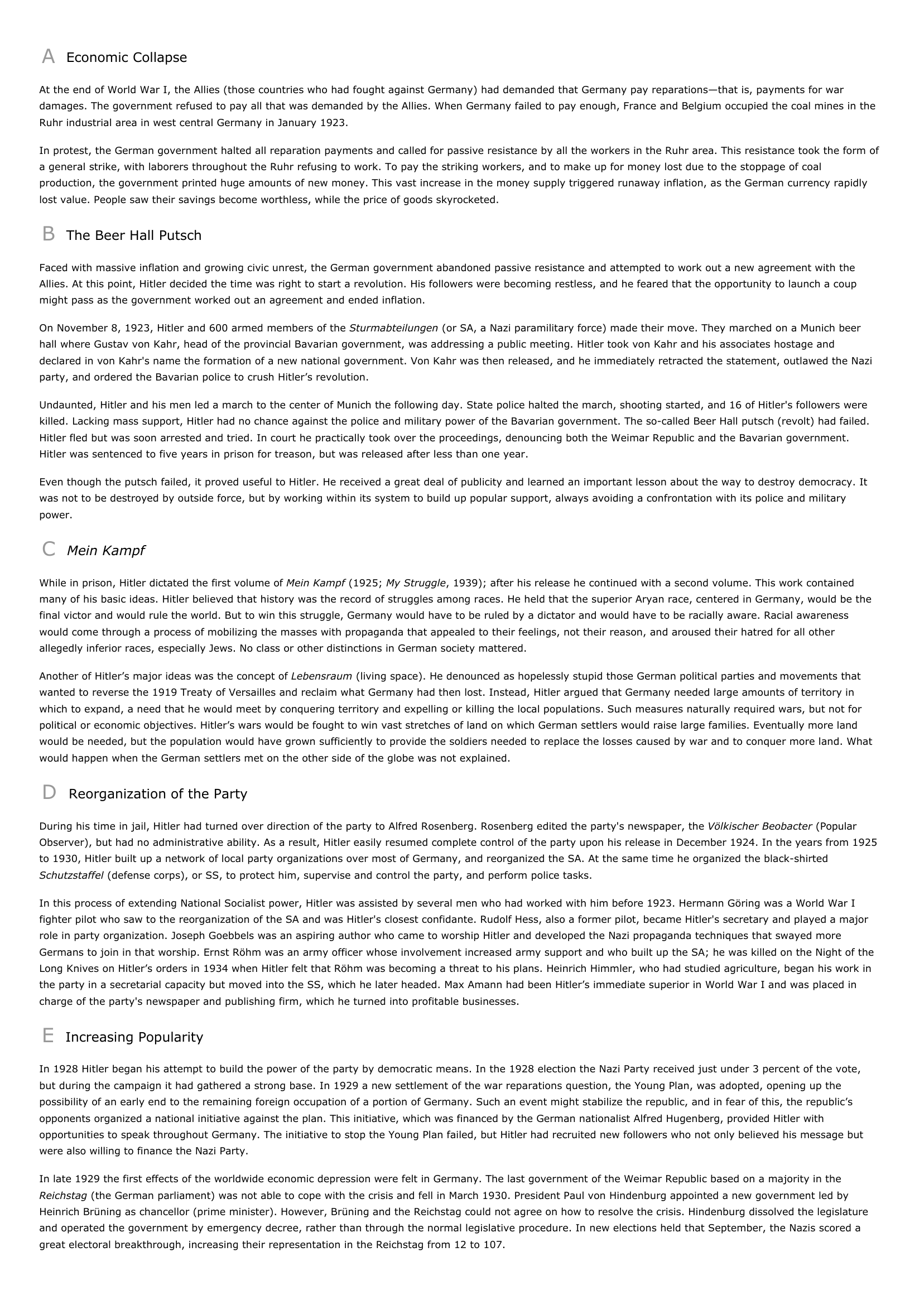Adolf Hitler I INTRODUCTION Adolf Hitler (1889-1945), German political and military leader and one of the 20th century's most powerful dictators.
Publié le 10/05/2013

Extrait du document


«
A Economic Collapse
At the end of World War I, the Allies (those countries who had fought against Germany) had demanded that Germany pay reparations—that is, payments for wardamages.
The government refused to pay all that was demanded by the Allies.
When Germany failed to pay enough, France and Belgium occupied the coal mines in theRuhr industrial area in west central Germany in January 1923.
In protest, the German government halted all reparation payments and called for passive resistance by all the workers in the Ruhr area.
This resistance took the form ofa general strike, with laborers throughout the Ruhr refusing to work.
To pay the striking workers, and to make up for money lost due to the stoppage of coalproduction, the government printed huge amounts of new money.
This vast increase in the money supply triggered runaway inflation, as the German currency rapidlylost value.
People saw their savings become worthless, while the price of goods skyrocketed.
B The Beer Hall Putsch
Faced with massive inflation and growing civic unrest, the German government abandoned passive resistance and attempted to work out a new agreement with theAllies.
At this point, Hitler decided the time was right to start a revolution.
His followers were becoming restless, and he feared that the opportunity to launch a coupmight pass as the government worked out an agreement and ended inflation.
On November 8, 1923, Hitler and 600 armed members of the Sturmabteilungen (or SA, a Nazi paramilitary force) made their move.
They marched on a Munich beer hall where Gustav von Kahr, head of the provincial Bavarian government, was addressing a public meeting.
Hitler took von Kahr and his associates hostage anddeclared in von Kahr's name the formation of a new national government.
Von Kahr was then released, and he immediately retracted the statement, outlawed the Naziparty, and ordered the Bavarian police to crush Hitler’s revolution.
Undaunted, Hitler and his men led a march to the center of Munich the following day.
State police halted the march, shooting started, and 16 of Hitler's followers werekilled.
Lacking mass support, Hitler had no chance against the police and military power of the Bavarian government.
The so-called Beer Hall putsch (revolt) had failed. Hitler fled but was soon arrested and tried.
In court he practically took over the proceedings, denouncing both the Weimar Republic and the Bavarian government.Hitler was sentenced to five years in prison for treason, but was released after less than one year.
Even though the putsch failed, it proved useful to Hitler.
He received a great deal of publicity and learned an important lesson about the way to destroy democracy.
Itwas not to be destroyed by outside force, but by working within its system to build up popular support, always avoiding a confrontation with its police and militarypower.
C Mein Kampf
While in prison, Hitler dictated the first volume of Mein Kampf (1925; My Struggle , 1939); after his release he continued with a second volume.
This work contained many of his basic ideas.
Hitler believed that history was the record of struggles among races.
He held that the superior Aryan race, centered in Germany, would be thefinal victor and would rule the world.
But to win this struggle, Germany would have to be ruled by a dictator and would have to be racially aware.
Racial awarenesswould come through a process of mobilizing the masses with propaganda that appealed to their feelings, not their reason, and aroused their hatred for all otherallegedly inferior races, especially Jews.
No class or other distinctions in German society mattered.
Another of Hitler’s major ideas was the concept of Lebensraum (living space).
He denounced as hopelessly stupid those German political parties and movements that wanted to reverse the 1919 Treaty of Versailles and reclaim what Germany had then lost.
Instead, Hitler argued that Germany needed large amounts of territory inwhich to expand, a need that he would meet by conquering territory and expelling or killing the local populations.
Such measures naturally required wars, but not forpolitical or economic objectives.
Hitler’s wars would be fought to win vast stretches of land on which German settlers would raise large families.
Eventually more landwould be needed, but the population would have grown sufficiently to provide the soldiers needed to replace the losses caused by war and to conquer more land.
Whatwould happen when the German settlers met on the other side of the globe was not explained.
D Reorganization of the Party
During his time in jail, Hitler had turned over direction of the party to Alfred Rosenberg.
Rosenberg edited the party's newspaper, the Völkischer Beobacter (Popular Observer), but had no administrative ability.
As a result, Hitler easily resumed complete control of the party upon his release in December 1924.
In the years from 1925to 1930, Hitler built up a network of local party organizations over most of Germany, and reorganized the SA.
At the same time he organized the black-shirtedSchutzstaffel (defense corps), or SS, to protect him, supervise and control the party, and perform police tasks.
In this process of extending National Socialist power, Hitler was assisted by several men who had worked with him before 1923.
Hermann Göring was a World War Ifighter pilot who saw to the reorganization of the SA and was Hitler's closest confidante.
Rudolf Hess, also a former pilot, became Hitler's secretary and played a majorrole in party organization.
Joseph Goebbels was an aspiring author who came to worship Hitler and developed the Nazi propaganda techniques that swayed moreGermans to join in that worship.
Ernst Röhm was an army officer whose involvement increased army support and who built up the SA; he was killed on the Night of theLong Knives on Hitler’s orders in 1934 when Hitler felt that Röhm was becoming a threat to his plans.
Heinrich Himmler, who had studied agriculture, began his work inthe party in a secretarial capacity but moved into the SS, which he later headed.
Max Amann had been Hitler’s immediate superior in World War I and was placed incharge of the party's newspaper and publishing firm, which he turned into profitable businesses.
E Increasing Popularity
In 1928 Hitler began his attempt to build the power of the party by democratic means.
In the 1928 election the Nazi Party received just under 3 percent of the vote,but during the campaign it had gathered a strong base.
In 1929 a new settlement of the war reparations question, the Young Plan, was adopted, opening up thepossibility of an early end to the remaining foreign occupation of a portion of Germany.
Such an event might stabilize the republic, and in fear of this, the republic’sopponents organized a national initiative against the plan.
This initiative, which was financed by the German nationalist Alfred Hugenberg, provided Hitler withopportunities to speak throughout Germany.
The initiative to stop the Young Plan failed, but Hitler had recruited new followers who not only believed his message butwere also willing to finance the Nazi Party.
In late 1929 the first effects of the worldwide economic depression were felt in Germany.
The last government of the Weimar Republic based on a majority in theReichstag (the German parliament) was not able to cope with the crisis and fell in March 1930.
President Paul von Hindenburg appointed a new government led by Heinrich Brüning as chancellor (prime minister).
However, Brüning and the Reichstag could not agree on how to resolve the crisis.
Hindenburg dissolved the legislatureand operated the government by emergency decree, rather than through the normal legislative procedure.
In new elections held that September, the Nazis scored agreat electoral breakthrough, increasing their representation in the Reichstag from 12 to 107..
»
↓↓↓ APERÇU DU DOCUMENT ↓↓↓
Liens utiles
- Richard Wagner I INTRODUCTION Richard Wagner (1813-1883), German composer, conductor, and essayist, one of the most influential cultural figures of the 19th century.
- Winston Churchill I INTRODUCTION Winston Churchill (1874-1965), British politician and prime minister of the United Kingdom (1940-1945, 1951-1955), widely regarded as the greatest British leader of the 20th century.
- Elvis Presley Elvis Presley (1935-1977), American singer and actor, one of the most popular and influential entertainers of the 20th century.
- Wolfgang Amadeus Mozart I INTRODUCTION Wolfgang Amadeus Mozart Wolfgang Amadeus Mozart, an 18th-century Austrian classical composer and one of the most famous musicians of all time, came from a family of musicians that included his father and sister.
- Igor Stravinsky I INTRODUCTION Igor Stravinsky (1882-1971), Russian American composer, one of the most influential figures of music in the 20th century.







